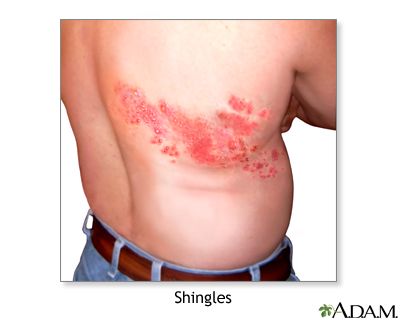Shingles

What is Shingles?
Shingles, also known as herpes zoster, is a viral infection that results in a painful rash, often appearing as a single stripe of blisters wrapping around either side of your torso.
Who’s at Risk for Shingles?
Anyone who has had chickenpox is at risk of developing shingles later in life, but the risk increases as you get older or if your immune system is weakened due to stress, disease, or medications.
What Causes Shingles?
Shingles is caused by the varicella-zoster virus, the same virus that causes chickenpox. After you've had chickenpox, the virus lies inactive in nerve tissue near your spinal cord and brain, and may reactivate as shingles years later.
How Does Shingles Start?
Shingles typically starts with pain, itching, or tingling in an area where the rash will develop, usually one to five days before the rash appears.
What Are the Symptoms of Shingles?
Common symptoms of shingles include pain, burning, numbness, or tingling, a red rash that begins a few days after the pain, fluid-filled blisters that break open and crust over, and itching.
How is Shingles Diagnosed?
Shingles is usually diagnosed based on the history of pain on one side of your body, along with the telltale rash and blisters. Laboratory tests can confirm the diagnosis if necessary.
How Can Shingles be Treated?
Shingles is usually treated with antiviral medications to reduce the severity and shorten the duration of the disease. Pain medicines, capsaicin topical patch, anticonvulsants, and corticosteroids may also be used.
What Complications May Occur with Shingles?
Complications of shingles can include postherpetic neuralgia (persistent pain), vision loss if shingles affects the eye, neurological problems, and skin infections.
How Can I Prevent Shingles?
Two vaccines are available to prevent shingles - the chickenpox (varicella) vaccine and the shingles (herpes zoster) vaccine.
Long-term Management of Shingles
Managing shingles involves taking prescribed medications, keeping the rash clean and dry to reduce the risk of infection, and applying cool, moist compresses to the blisters to reduce pain and itching.
What is Recent Research Saying About Shingles?
Recent research is exploring the reasons why the varicella-zoster virus reactivates in some people, developing new and more effective vaccines, and understanding the long-term effects of the disease.
Where Can I Go For More Information on Shingles?
For more information on shingles, visit reputable health websites like the Centers for Disease Control and Prevention (CDC), Mayo Clinic, or the National Foundation for Infectious Diseases.

